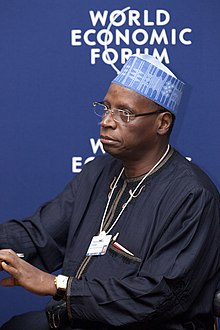Shamsuddeen Usman | |
|---|---|
 Shamsuddeen at World Economic Forum on Africa 2012 | |
| Minister of National Planning | |
| In office January 2009 – 11 September 2013 | |
| President | Umaru Yar'Adua Goodluck Jonathan |
| Preceded by | Sanusi Daggash |
| Succeeded by | Abubakar Sulaiman |
| Finance Minister of Nigeria | |
| In office June 2007 – January 2009 | |
| President | Umaru Musa Yar'Adua |
| Preceded by | Nnenadi Usman |
| Succeeded by | Mansur Mukhtar |
| Deputy Governor, Central Bank of Nigeria- Operations | |
| In office 2004 – June 2007 | |
| Governor | Charles Chukwuma Soludo |
| Preceded by | Mahey Rasheed |
| Deputy Governor, Central Bank of Nigeria- Financial Sector Surveillance | |
| In office June 1999 – 2004 | |
| Governor | Joseph Oladele Sanusi |
| Preceded by | None |
| Personal details | |
| Born | 18 September 1949 Kano, Northern Region, British Nigeria (now Kano, Kano State, Nigeria) |
| Alma mater | London School of Economics Ahmadu Bello University Kings College Lagos |
Shamsuddeen Usman, CON, OFR (born 18 September 1949) is a Nigerian economist, banker, technocrat and public servant. He is currently the CEO of SUSMAN & Associates, an economic, financial and management consulting firm headquartered in Nigeria. He was the Finance Minister of Nigeria between June 2007 and January 2009 and also served as the Minister of National Planning from January 2009 to September 2013.[1][2] Usman is the Chairman of Citibank Nigeria Limited.[3]
As Minister of National Planning, he was responsible for the development of Nigeria's long-term development strategy, Nigeria Vision 2020 and the National Integrated Infrastructure Master Plan. During his tenure as the Minister of Finance and National Planning, he was the Chairman of the Nigerian National Economic Management Team.[1][4]
He represented Nigeria as a Governor on the Governing Boards of the World Bank and the International Monetary Fund. He was a Member of the Federal Executive Council, National Economic Council and the National Council on privatization.[1]
He was the first Nigerian Minister to publicly declare his assets before assuming office as a public officer, an act considered as a sign of accountability and transparency in a country noted for its high levels of corruption.[5]
- ^ a b c "Shamsuddeen Usman". World Economic Forum. Retrieved 12 September 2020.
- ^ "Usman joins Dantiye Centre". The Punch. 13 July 2020. Retrieved 22 December 2020.
- ^ "Citibank Appoints Shamsuddeen Usman Chairman". This Day. 3 August 2022. Retrieved 6 October 2024.
- ^ "Economic Management Team – The Statehouse, Abuja". Retrieved 23 May 2024.
- ^ Galadima, Anas (24 August 2007). "Usman Declares Asset". Daily Trust. Retrieved 18 May 2023 – via allAfrica.